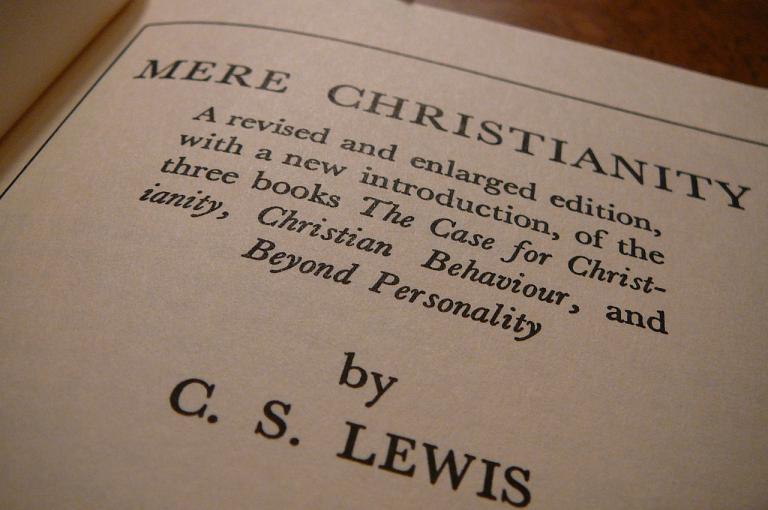
Perhaps after the question of the existence of God, no more significant issue faces Catholicism than whether Jesus of Nazareth was Himself God. While the Bible provides the foundation for what Catholics believe about Christ, one of the more intriguing arguments for Jesus’ Divinity was put forth by C.S. Lewis. In his book, Mere Christianity, Lewis develops a kind of hypothetical argument that has become known as the trilemma.
In this essay, I will examine the trilemma formulated in Mere Christianity and suggest that Lewis’ argument requires a modification to avoid being fallacious.
Within the world of apologetics, C.S. Lewis looms large. Lewis was an Irish-born scholar, novelist, and author of about forty books on Christian apologetics, including Mere Christianity. However, his work of greatest lasting fame may be The Chronicles of Narnia, a series of seven children’s books that have become classics of fantasy literature.
In Mere Christianity, Lewis develops his trilemma. Before stating Lewis’ argument, it is essential to point out that Lewis is not arguing against atheism per se but rather a kind of religious complacency that seeks to reduce Christ to a moral teacher.
Lewis writes, “I am trying to prevent anyone saying the really foolish thing that people often say about Him: ‘I am ready to accept Jesus as a great moral teacher, but I do not accept His claim to be God.’ That is the one thing we must not say. A man who was merely a man and said the sort of things Jesus said would not be a great moral teacher. He would either be a lunatic–on the level with the man who says he is a poached egg–or else he would be the Devil of Hell. You must make your choice. Either this man was, and is, the Son of God, or else a madman or something worse. You can shut him up for a fool, you can spit at him and kill him as a demon, or you can fall at his feet and call him Lord and God. But let us not come up with any patronizing nonsense about his being a great human teacher. He has not left that open to us. He did not intend to. We are faced, then, with a frightening alternative. This man we are talking about either was (and is) just what He said, or else a lunatic, or something worse. I have to accept the view that He was and is God.”
In a sense, Lewis’ argument can be viewed as a three-horned dilemma, thus a trilemma. The standard dilemma in logic entails two propositions, both of which usually lead to undesirable conclusions. In Lewis’ argument, there are three propositions.
In the first proposition, Jesus is a liar since the Scriptures depict several instances where Christ claimed that He was God. In this proposition, Christ knows He is not God, yet speaks and acts as if He were. There are several problems with this claim. First, there is the adage that actions speak louder than words. Christ did not simply say that He was God but acted in a manner congruent with that claim. By most accounts, the Gospels record thirty-seven miracles performed by Christ. From turning water into wine to healing the sick to raising the dead and forgiving sins, Christ performed actions impossible for a mere human being. If Jesus had simply claimed to be God, it is conceivable that he was a liar. However, the performance of miracles and the forgiving of sins rule out this proposition.
Or, perhaps Jesus actually believed He was God when He is not. That is to suggest that Jesus was somehow delusional and believed Himself to be God. Here again, the actions of Jesus militate against this proposition. Believing one is God is quite different from performing actions only God can do. Moreover, Jesus’ capacity for high-level reasoning, including using syllogisms and enthymemes, is suggestive of a person very much in control of their intellectual faculties. That leaves one possibility. Jesus is who He says He is, God.
Lewis’ argument, therefore, can be formulated syllogistically. Jesus was either a liar, a lunatic, or the Lord. Since the argument proves that Jesus was neither a liar nor a lunatic, it seems we are left to conclude that the final proposition that Jesus is Lord is correct.
Unfortunately, the argument as it has thus far been formulated is fallacious. The problem lies in the fact that Lewis presupposes the existence of Jesus of Nazareth as a historical figure. Is it possible that the synoptic Gospels are depictions of a legend and not an actual historical person? In order to avoid arguing in a circle, it is necessary to prove the historical existence of Jesus.
If one considers the vast number of manuscripts, the dating of the texts, and the archaeological evidence, it is all but impossible to argue against the historical viability of Scripture. So much so that the Smithsonian Institution’s Department of Anthropology concluded that “The historical books [of the Bible] are as accurate historical documents as any that we have from antiquity and are, in fact, more accurate than many of the Egyptian, Mesopotamian, or Greek histories. These Biblical records can be and are used as are other ancient documents in archaeological work.”
Furthermore, the accounts of Christ’s life were codified within sixty years of the Crucifixion, some within twenty years. This would mean that much of the information provided about Jesus comes from people who either knew Him directly or people who knew someone who knew Jesus. Instead of fables concocted by various authors, the Gospels are accounts of historical people and events.
Lastly, the Bible is not the only source referencing the life of Christ. Jesus is alluded to by Roman historians from antiquity, like Tacitus, Suetonius, and Pliny the Younger. All of this is to point out that there is no reasonable reason to deny that Jesus of Nazareth was a historical person.
In conclusion, I suggest a simple reformulation of C.S. Lewis’ trilemma. Jesus of Nazareth existed as a historical figure who claimed to be God. He was not a liar nor a lunatic. He is indeed the incarnate Lord.












